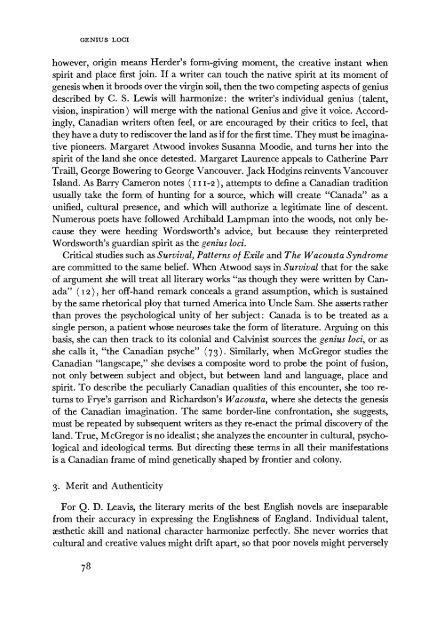GENIUS LOCI
GENIUS LOCI
GENIUS LOCI
You also want an ePaper? Increase the reach of your titles
YUMPU automatically turns print PDFs into web optimized ePapers that Google loves.
<strong>GENIUS</strong> <strong>LOCI</strong><br />
however, origin means Herder's form-giving moment, the creative instant when<br />
spirit and place first join. If a writer can touch the native spirit at its moment of<br />
genesis when it broods over the virgin soil, then the two competing aspects of genius<br />
described by C. S. Lewis will harmonize: the writer's individual genius (talent,<br />
vision, inspiration ) will merge with the national Genius and give it voice. Accordingly,<br />
Canadian writers often feel, or are encouraged by their critics to feel, that<br />
they have a duty to rediscover the land as if for the first time. They must be imaginative<br />
pioneers. Margaret Atwood invokes Susanna Moodie, and turns her into the<br />
spirit of the land she once detested. Margaret Laurence appeals to Catherine Parr<br />
Traill, George Bowering to George Vancouver. Jack Hodgins reinvents Vancouver<br />
Island. As Barry Cameron notes ( 111-2 ), attempts to define a Canadian tradition<br />
usually take the form of hunting for a source, which will create "Canada" as a<br />
unified, cultural presence, and which will authorize a legitimate line of descent.<br />
Numerous poets have followed Archibald Lampman into the woods, not only because<br />
they were heeding Wordsworth's advice, but because they reinterpreted<br />
Wordsworth's guardian spirit as the genius loci.<br />
Critical studies such as Survival, Patterns of Exile and The Wacousta Syndrome<br />
are committed to the same belief. When Atwood says in Survival that for the sake<br />
of argument she will treat all literary works "as though they were written by Canada"<br />
(12), her off-hand remark conceals a grand assumption, which is sustained<br />
by the same rhetorical ploy that turned America into Uncle Sam. She asserts rather<br />
than proves the psychological unity of her subject: Canada is to be treated as a<br />
single person, a patient whose neuroses take the form of literature. Arguing on this<br />
basis, she can then track to its colonial and Calvinist sources the genius loci, or as<br />
she calls it, "the Canadian psyche" (73). Similarly, when McGregor studies the<br />
Canadian "langscape," she devises a composite word to probe the point of fusion,<br />
not only between subject and object, but between land and language, place and<br />
spirit. To describe the peculiarly Canadian qualities of this encounter, she too returns<br />
to Frye's garrison and Richardson's Wacousta, where she detects the genesis<br />
of the Canadian imagination. The same border-line confrontation, she suggests,<br />
must be repeated by subsequent writers as they re-enact the primal discovery of the<br />
land. True, McGregor is no idealist; she analyzes the encounter in cultural, psychological<br />
and ideological terms. But directing these terms in all their manifestations<br />
is a Canadian frame of mind genetically shaped by frontier and colony.<br />
3. Merit and Authenticity<br />
For Q. D. Leavis, the literary merits of the best English novels are inseparable<br />
from their accuracy in expressing the Englishness of England. Individual talent,<br />
aesthetic skill and national character harmonize perfectly. She never worries that<br />
cultural and creative values might drift apart, so that poor novels might perversely<br />
78

















